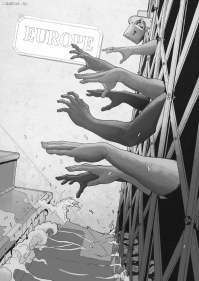The Kos Paradigm
 The current refugee crisis in the Mediterranean is a direct consequence of having elected counter-culture politicians and being under the influence of a May of 68 generation of journalists. It is staggering that under the weight of such incontrovertible evidence of, what can only be called, a disastrous policy, the public opinion – including those most affected – remains unchanged. Perhaps the most egregious example at the moment is that of the island of Kos in Greece or that of Calais, in the channel.
The current refugee crisis in the Mediterranean is a direct consequence of having elected counter-culture politicians and being under the influence of a May of 68 generation of journalists. It is staggering that under the weight of such incontrovertible evidence of, what can only be called, a disastrous policy, the public opinion – including those most affected – remains unchanged. Perhaps the most egregious example at the moment is that of the island of Kos in Greece or that of Calais, in the channel.
When the illegal immigration crisis began in earnest, two camps emerged advocating for diametrically opposed policies. One led by the centrist and left-wing parties as well as supported by the politically correct media, defended opening the doors to the migrants and rescuing as many as possible. The other, for the most part limited to fringe right-wing and populist parties, advocated for the use of law enforcement means to turn the boats around, reject the migrants and deter any future temptations to cross the Mediterranean.
Greece, in the midst of a severe economic crisis, followed the open door policy. In the island of Kos, 1/4 of the population is now made up of illegal migrants. A major surprise seemed to have been that a government struggling to secure the miserable pension paychecks for its own population (and with much of the working-age segment unemployed), was unable to find financial means to provide adequate aid to the enormous wave of migrants. The solution, the media keeps parroting, is for the well off countries of northern Europe to pick up the bill for the subsistence costs of the newly arrived migrants. This is typical of those who despise the nation-state and non-ideological policies. Be they Euro-federalists or Global humanitarians, that Greece and Europe should be turned into a multicultural United States, with the associated problems, in the middle of an economic crisis, is actually a good idea. The riots of Paris, London, Malmo or the terrorism of France, the Netherlands, the UK; none of it matters. That ghettos emerge in countries such as Belgium where the fantastic wave of unqualified, culturally dissimilar, immigrants only adds to the enormous problem of unemployment and social security unsustainability, all that is unimportant. Mere details to be ignored by high-minded hippie politicians.
Let us say that the policies of the left were followed to their logical conclusion: the north paid for the rescue of and aid to the migrants, immigration was made legal and all migrants naturalized. Let us assume that the tens of millions fleeing Africa and MENA were welcomed in Europe. What evidence is there that Europe would turn into anything but another Brazil, with slums, extreme crime and bad economic governance? The West has spent trillions in development aid and yet the societies it seeks to transform have not been transformed. Are we now to adopt them into change? What does this say of the responsibility and probity of politicians who should look after the best interests of their constituencies rather than trying to transform them top-down according to whichever ideology they espouse?
 Does the immigration policy solve the refugees problem? No. Does it benefit the Greek population or the local economy? No. Is it a sustainable policy in any way shape or form? Not at all. Will the policy be maintained? Of course it will. Naturally, the establishment is stupefied that such political pearls as Golden Dawn make gains in the popular vote…
Does the immigration policy solve the refugees problem? No. Does it benefit the Greek population or the local economy? No. Is it a sustainable policy in any way shape or form? Not at all. Will the policy be maintained? Of course it will. Naturally, the establishment is stupefied that such political pearls as Golden Dawn make gains in the popular vote…
This is a suicidal policy but why be surprised at the monstrous irresponsibility and lack of patriotism when this is the same political class that spent into bankruptcy and left it up to the next generation to pick up the tab?
Redistricting the Middle East
An emerging Buffer-Crescent
John Snyder writing for Foreign Policy once offered as examples of idealist foreign policy, Bin Laden and Gandhi. Some might find equating the two to be perverse but in fact they have something specific in common. Snyder was comparing International Relations constructivism with Realism and Liberal Internationalism and in this context, constructivists share their opposition to methodological individualism, i.e. materialist approaches.
Ultra-salafists like Pacifists believe in natural law – that certain rights and values are immanent and naturally present in all individuals – and also believe in taking the initiative in promoting their goals: were they to take a tactical and for the lack of a better word ‘political’ approach, they’d be as centrist and unprincipled as those they criticise; they therefore prefer to take a stand and stick to it. As constructivists, idealists wish to engineer a new and virtuous world and they believe that ideas alone can guide change. They thus present themselves to the world and fight henceforth for the implementation of their ideals.
Bin Laden proclaimed Jihad on America, Gandhi warned the British to go. They differed on methods but the righteousness of their cause was never at stake. They both believed that their values were superior and universal. Islam is the only true religion and freedom to all peoples would be only conducive to inter-community dialogue and peace.
Of course an absolutist doctrine tends to emerge from and provide incentives for the increase in polarisation. This is clearly visible in the US today after all the gerrymandering that was seen throughout decades and which has generated a very politically divided atmosphere. The same is true of the Middle East where forces such as neoconservatives, jihadists and radical shia have been busy pushing the region towards extremes since the beginning of the century.
Until now the Middle East had broadly two buffer zones –areas where spheres of interest juxtaposed: Iraq and Lebanon with their religious and ethnic separations stood as irrevocably vulnerable to some form or another of foreign intervention. Lebanon tried to deregulate itself in a libertarian fashion in order to appease its neighbours but as soon as core national interests related to security came into question it fell into civil war and/or weak governability. With Saddam Hussein Iraq was multicultural and unified; without an authoritarian government however, it soon fell into ethnic and creed strife. None of these countries has ever existed before and it would now seem that such lack of precedent is not without reason for the absence of a strong national identity prevents them from ever rising above devolution or extreme centralism. In other words they are non-functional polities.
In spite of the artificial nature of the borders, the colonial legacy left in place a modicum of balance of power in the Middle East and this important legacy for stability has now been corrupted by the Freedom campaigns: in seeking to exogenously rid the region of its non-conformal nature with the values of the West, the successive interventions there have only managed to upset local hegemons or disrupt otherwise stable dependencies.
One of the nasty consequences of polity engineering has been a massive redistricting of the Middle East: just as in America gerrymandering led to more ideologically pure constituencies, so have the identity barriers deepened in this region – where they were already feeble. As a result, the viability of cohesive-enough polities to sustain the balance of power has eroded and with them stability. This is the direct outcome of trying to insert ‘fundamental’ rights in areas where security takes precedence, of trying to build federal models where civil society and democratic culture have little or no bearing on political priorities and needs. The Arab Spring seems to be continuing this trend, as ethnic tensions in Egypt, Libya and Syria apparently demonstrate.
Minorities Meridian
On a wide perspective what were but two buffer zones for regional power centres – Iraq, Lebanon – have now become three – Syria. An immense Buffer-Crescent of instability is now a political reality in the Middle East and the Arab world seems to be its greatest victim. While the Iranian and Turkish polities have prospered, the Arab world seems to more and more bear the brunt of ethnic plurality. Apart from the Arab-shia/Curd components of the Buffer-Crescent, the Levantine ethnic exception to Middle Eastern Suni Arab majority is now also causing problems as a minorities meridian of Armenians, Alawites, Druzes, Maronites, Arab Christians and Jews stretches from the borders of Turkey to the Sinai, ready to be instrumentalised by the regional powers.
Rumours have it that Saudi Arabia and Jordan would be interested in having Syria’s Euphrates valley and Deir Al-Zour, along with its traditionalist Sunni population, amputated and eventually merged with Iraq’s Anbar province so as to create a polity loyal to Saudi Arabia and the GCC and which might thus be able to expand and consolidate the Arab anti-Iranian influence in the Mashreq.
In the long term, were this minorities-meridian to unite, it might constitute a strategic counter-balance to Arabs, Turks and Iranians. While its profuse diversity might hinder plans of geopolitical union, the Balkans are a good example of how polities can merge in order to face an external threat. Given unity, a political entente with one of the other hegemons – probably Iran – might help reshape a new balance of power.

